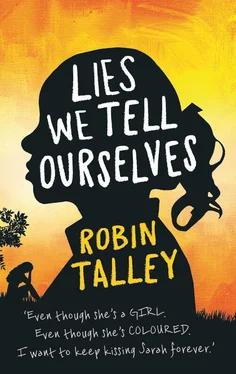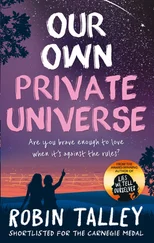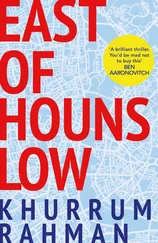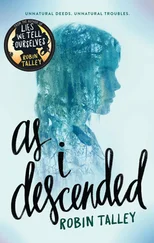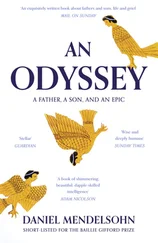Or smell them. I sniff the air to see if the girl has made the bathroom stink yet. So far it’s just the usual smell of disinfectant and old paint, but she hasn’t been here long.
Judy looks at me, waiting for me to tell her what to do, but I don’t know what to say. When someone’s praying, you’re supposed to be quiet and respectful. But those are the rules for white people. Are they the same for Negroes? It’s so hard to keep track.
There’s still another minute until French, and Judy isn’t done with her makeup yet. I gesture for her to keep working on her cheek. She turns back to the mirror.
There’s something wrong with the colored girl. Her lips are moving quickly but silently, and she’s rocking up and down. She’s crying. I wonder what’s upset her so much.
If Daddy ever finds out I was in a bathroom with one of them, by choice, he’ll let his hand fly after all.
The girl goes on praying for a long time. She looks familiar. I must’ve seen her before, but it’s hard to tell them all apart.
Then I remember. This girl is the one from French. The one who called me “awful.”
She’s the worst of the whole lot.
Why did she have to run in here, out of all of them? Why do these colored people have to keep making my life harder?
Finally the girl stops rocking. She keeps her head bowed and her eyes shut, but her lips aren’t moving anymore.
It’s strange seeing a colored person so close up. Her hair is straight, but it looks rough and coarse. Not like my hair or Judy’s at all. And her skin is so dark. Much darker than mine gets even after I’ve been out in the sun for months. Touching her probably feels like touching sandpaper. Not that I’d ever touch colored skin.
It would be all right for us to leave now. God would understand. The truth is, though, I want to know what’s wrong with this girl.
I’m just curious. Who wouldn’t be?
And it doesn’t matter if I’m a tiny bit late to French. None of the teachers ever give me detentions, not if they want to get invited to the Christmas parties. My mother has been president of the Jefferson PTA since my oldest brother was a freshman.
“Are you all right?” Judy asks the girl when she finally opens her eyes.
I glare at Judy. She whispers an “Oh” and looks apologetic.
Judy never remembers you’re supposed to act differently around different people. If it weren’t for me, she’d talk to this colored girl the same way she talks to Reverend Pierce.
The colored girl doesn’t show any sign of having heard Judy. She’s looking down at her clothes. I wonder if she’s checking for stains. This morning I saw one of the other colored girls get sprayed with ink outside the library. Everyone was laughing. It made me think of the time Eddie Lowe pushed me into a puddle in second grade when I was wearing my new Easter dress. I got so upset Daddy wrote an angry letter and Eddie’s father sent us a check for five dollars to buy me a new one.
The girl this morning didn’t look upset, though. She just kept walking with her head held up so high I wanted to look around for her puppet strings.
“I’m leaving,” this colored girl says, standing up.
“You don’t have to,” Judy says. “No one ever comes in this bathroom. If you want to be alone—”
Judy stops talking when I shake my head at her. It’s one thing to show basic human decency. It’s another to go out of your way to accommodate someone who’s trying to change our whole way of life.
I wrote an editorial about that for the school newspaper last year. I said if the integrationists won, the rest of us should behave like civilized people, but we shouldn’t feel obligated to act happy about things.
Daddy liked that column. Or anyway, Mom told me she thought he probably did.
The colored girl is looking at Judy, her head tilted. Even with her dark skin and old, patched clothes, the colored girl is pretty. She has long hair, longer than the style is now, and her eyes are wide and dark.
It’s strange. I’ve never thought of a colored girl as being pretty before. My friends whisper sometimes about how a few of the colored boys look all right, but everyone says that’s because so many of them are tall and muscled from working outside. I don’t know what would make a colored girl nice looking, exactly. But then, I’d never seen a colored girl up close before yesterday.
“Do you need—?” the colored girl starts to ask Judy. Then she stops. Judy cups her hand over her cheek, and I realize what the girl is looking at. Judy never finished fixing her makeup. The colored girl saw her birthmark.
Judy takes out her makeup case and hurries to brush more onto her face.
“Never mind,” the colored girl says. “I’ll be leaving now.”
“Good.” I tug Judy’s elbow. “You can leave the whole school while you’re at it, and take your friends with you. Hurry up, Judy, we’re already late.”
“Are you all right?” Judy asks the girl as she sweeps on more makeup. “You were crying. And—praying.”
“Don’t talk to her, Judy,” I whisper.
The colored girl looks at me, tilting her head to one side. I look back just as fiercely. What gives her the right to stare at me?
She looks like she’s thinking hard. Deciding something. Finally, she opens her mouth. When she speaks, it’s slow, like she’s measuring each word before she says it.
“Since when do you care about being polite?” the colored girl says.
Judy gasps. I would, too, except I can hardly breathe at all.
I can’t believe she spoke to me that way.
No one speaks to me that way.
No one who’s not related to me, anyway. Certainly not a Negro.
Who does this girl think she is?
And after I just finished helping that other colored girl, too. If it weren’t for me that little girl would be splattered all over the lockers by now.
Daddy was right. The Negro students think they’re entitled. They think their own schools—the ones set aside specifically for them—aren’t enough. They think they have to come to our schools, even if it means hundreds of us have to suffer just so a handful of them can be satisfied.
The colored girl smiles. As though she’s proud of herself.
“I didn’t ask you to come to this school,” I tell her.
A corner of the girl’s lip turns up.
Is she laughing at me?
“I’ve got you figured out,” she says. “You’re Linda Hairston, aren’t you? Your father is William Hairston.”
“Yes,” I say. Everyone knows that. I don’t know why this girl is acting as if knowing it makes her special.
“You were the one talking to that gang of white boys. You called my sister dumb.”
Oh. I try to remember if I heard anything about two of the integrators being sisters, but I don’t think the paper said anything except that there were ten of them and they’d all claimed they weren’t Communists.
“So why did you get in front of her in the first place?” the girl asks me. “Some sort of stunt to show that your father isn’t the monster his editorials make him out to be?”
“My father’s no monster,” I hiss.
But I do wonder why I got between Bo and that girl. I was mad at Bo, sure, but I could’ve just made fun of him in the cafeteria or something instead.
I guess it just didn’t seem right, what Bo was doing. A whole group of boys, going after a little freshman girl.
And there was something about the little girl’s face, too. She looked so afraid. It didn’t seem right that she had to be so scared just because she was a Negro. She couldn’t help her color.
She could help being an agitator, though. She shouldn’t have been stirring up trouble at our school. What happened to her was her own fault. I’m too softhearted for my own good.
Читать дальше
